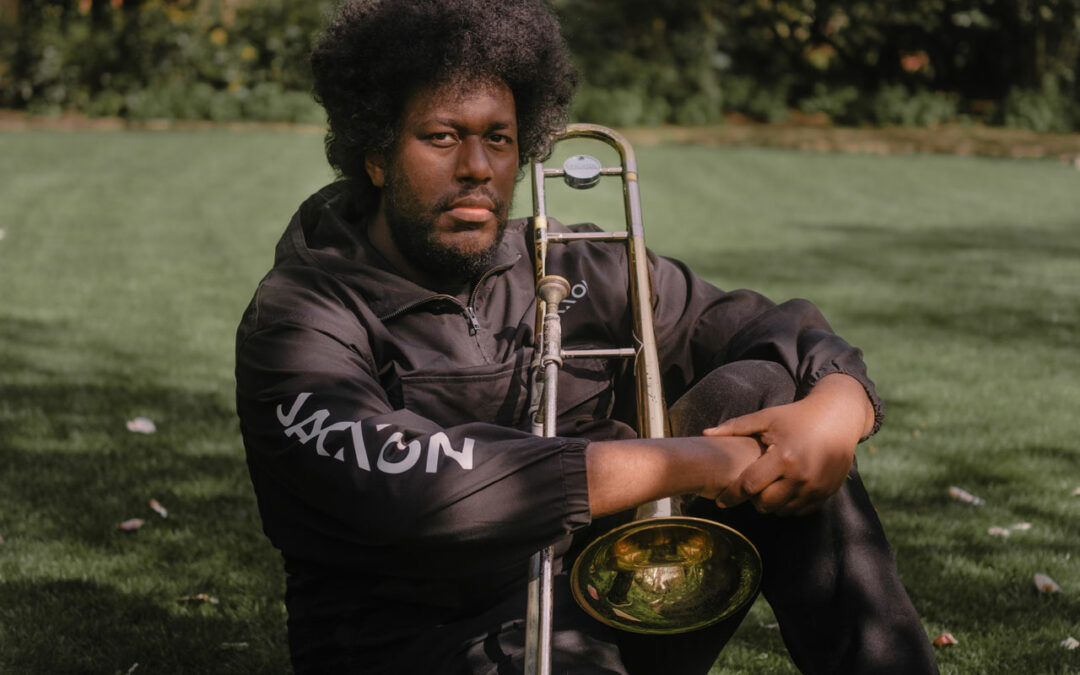Beserat Tafesse photo by Randy Rizzo
BY PAUL RAUCH
The resident Seattle jazz scene provides many choices for local jazz fans interested in supporting live music. Many of our resident players have developed a national profile through recordings, tour dates, and other high-profile projects over decades of time. There are many, as well, who are in exploration mode, still trying to discover their voice to lend to their own work as well as the work of other artists. Trombonist Beserat Tafesse is clearly of the latter. Since his return to the Seattle area from New York, he has continued what seems like a life-long pilgrimage to find his voice in order to tell us who he is both as an artist and person.
Tafesse was born and raised in Redmond by parents from Ethiopia who met in Seattle under very different circumstances. His mother arrived as an eighteen-year-old student, while his father had refugee status stemming from fighting in the second civil war in Ethiopia in the 1970s. Their son grew up with jazz playing in their home, most notably the fusion between American jazz and Ethiopian classical music dubbed “Ethiojazz.” Virtually non-verbal until age four, music would prove to be the voice the young Tafesse felt most comfortable communicating with.
“Music gave me the language to speak,” he recalls, a belief that led him to study classical euphonium and valve trombone at Redmond High School and Central Washington University. “It lit up all the other aspects of my personality.” He doubled on slide trombone at Central due to the fact that the University did not have a valve trombone on campus. While in Ellensburg, he developed an interest in jazz, first strictly as a listener, then as a trombonist. That interest led to entrance in a master’s program at the prestigious Manhattan School of Music (MSM) in New York, where he transitioned completely to the slide trombone. “I felt like it was closer to the voice I wanted,” he finally ascertained after the change.
His tenure at MSM led to six years of New York residence that provided his “real education” concerning jazz artistry. He had learned to access his voice but was still discovering what all he wanted to say. Still, New York provided many answers for the young trombonist.
“The experience helped me grow a lot; I have more clarity in what I know and believe because of it,” says Tafesse. Studying with masters like Steve Turre gave his approach nuance, while six years of playing gigs, attending jam sessions, and just plain living in New York stacked real life education on top of his studies at MSM. However, he didn’t like the person he was becoming while living there. He needed a change in lifestyle and quality of life, factors all pointing to a return home to Seattle.
“In New York, I learned to speak. I really learned what the music is. In Seattle, I’m learning my voice, I’m learning what I want to say,” says Tafesse. His performances as a leader have largely been in the quartet format, including two separate dates at the Seattle Jazz Fellowship. His most recent performance featured a foursome with pianist Matt Williams, drummer Xavier Lecouturier, and bassist Alexianne Vega. Tafesse played the 2022 Earshot Jazz Festival with Thomas Marriott’s Fellowship ‘Ceptet alongside Seattle stalwarts Mark Taylor, D’Vonne Lewis, and Marina Albero.
At age 31, Tafesse occupies that land mass between being a recipient of the mentorship of older, more experienced elders on the scene and dispensing what he has learned as a mentor to others, cemented by his professorship at Cornish College of the Arts. The latter is something he is still very reticent about. He understands the tradition and has benefited from it greatly. Yet, as a bit of a latecomer to jazz both as a musician and listener, his honest sense of humility and gratitude allows him to understand his place. It is also emblematic of the man.
Tafesse’s sound is strong, melody-based, and best understood when playing longer tones with a full spectrum of light. His rapid passages lean more towards bebop saxophone than a more traditional path blazed by the great J.J. Johnson. Music has played an indelible role in determining his path to not only artistry, but as a torch illuminating his path to socialization throughout his life. The trombone part of his story, that which is impacted by masters like Johnson, Curtis Fuller, and Julian Priester, has, by measure, only just begun.





